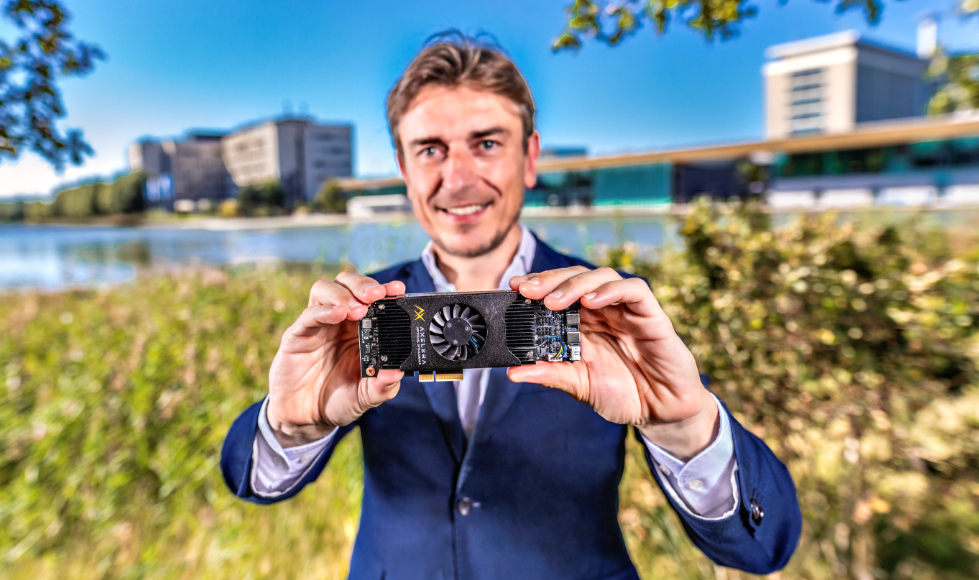Edge artificial intelligence chip startup Axelera AI B.V. today revealed it’s partnering with Arduino s.r.l., a maker of specialized, open-source microcontroller boards, to support companies trying to implement high-performance artificial intelligence workloads at the network edge.
The partnership will make edge AI more accessible, enabling companies to perform inference on low-powered chips installed at any location, so data can be processed where it’s created.
Axlera AI sells purpose-built silicon for generative AI and computer vision. Its flagship hardware is known as the Metis AI Platform, which is based on the RISC-V architecture that rivals Arm-based chips.
The Metis AI Platform is optimized to run AI at the network edge, featuring an in-memory processing engine, enabling it to process data much faster than traditional computer chips can. According to Accelera, Metis can perform 39.3 trillion computations per second, or 39.3 TOPS, under normal conditions, and boost this to a maximum of 48.16 TOPS when increasing the chip’s clock frequency.
The hardware is also designed to be more energy-efficient than regular central processing units, making it more suitable for the low-powered devices it’s intended to run. Many of those devices are battery-powered, so they can benefit from processors that run on limited power.
As for Arduino, it’s a major manufacturer of microcontroller boards, which are miniature computers that measure just a few inches across. Also known as systems-on-modules or SOMs, they feature a small processor, memory and supporting components, enabling them to perform simple computing tasks without any external assistance.
Alongside its SOMs, Arduino also provides cloud-hosted device management software, which can be used to control fleets of Arduino SOM-powered devices, with tools to collect and visualize the sensory data they generate.
Axelera said it will combine its Metis AI chips with Arduino’s SOMs to give customers everything they need, including the specialist hardware, data processing components and software, to deploy powerful AI systems on edge devices. It believes it will enable higher performance than has previously been possible, with lower costs than existing edge AI solutions.
The two companies plan to showcase their collaboration at next month’s Consumer Electronics Show 2025 in Las Vegas. They intend to demonstrate how one of Arduino’s Portenta X8 microcontrollers running the Metis AI Platforms can run an offline, pretrained large language model that supports an industrial monitoring system capable of processing and analyzing sensory data, such as temperature, humidity, air quality, CO2 and other details in real time.
The system can run in different environments and on multiple kinds of factory machines. That enables manufacturers to monitor production and identify any trends and issues as they happen.
The partnership has enormous potential, according to Axelera, which said Arduino’s SOMs are already used by more than 33 million people worldwide. Everyone of those users will be able to access the Axelera platform and unlock new possibilities for edge AI, the company says.
Axelera co-founder and Chief Executive Fabrizio Del Maffeo (pictured) said the partnership will provide fast, easy-to-access AI technology with minimal power consumption and cost. “This is critical for companies to realize true AI innovation,” he said.
Arduino CEO Fabio Violante agreed, saying the partnership will enable innovators with more powerful and accessible tools for real-world problem solving. “By working with Axelera AI, we’re providing developers and businesses the means to integrate advanced AI capabilities into their projects, opening the door to groundbreaking innovations across industries,” he said.
Photo: Axelera
Your vote of support is important to us and it helps us keep the content FREE.
One click below supports our mission to provide free, deep, and relevant content.
Join our community on YouTube
Join the community that includes more than 15,000 #CubeAlumni experts, including Amazon.com CEO Andy Jassy, Dell Technologies founder and CEO Michael Dell, Intel CEO Pat Gelsinger, and many more luminaries and experts.
THANK YOU









